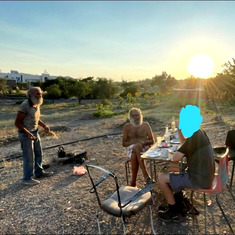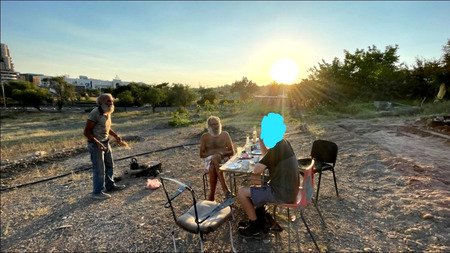
Learning a Language for Traveling - The Fastest Way
First published: Tuesday December 26th, 2023
Report this blog
Traveling is fun, but it can even be more rewarding when you understand the local language. Especially in countries, where english is not widely spoken, you will be able to get to places no tourist has been before, just because you learned a couple of sentences in their language. In this blog, I will show you, how you can achieve that with the least amount of effort.
Common Mistakes
When you look up for typical travel survival sentences, you usually get to learn sentences like "Where is the hotel?" or "How do I get to the hospital?". In fact, you will never use these sentences. Here is why:
- Pronounciation can be a difficult thing to learn, there is a big chance that the person will not understand what you're asking, if you don't practice them enough.
- Even if they understood, there are dozens of ways to answer these questions so that you will not be able to understand what the person is saying. You will have to rely on them pointing with their fingers.
- You could get away with only learning sentences like "Where hotel" or "Where hospital". No need to learn the whole sentence
- Think about how often you will need to ask for the hotel or the hospital. People on the streets usually don't know where your hotel is located, and when it comes to the hospital, it's probably better to just learn the emergency phone number, where they can (hopefully) respond in english as well.
- Nowadays, all these problems can be solved with a simple free wifi or sim card and Google Maps. Also a good tip is to download an offline map before you go. And for complex sentences, you can use a translator.
When everything can be solved with a translator, why should you learn the language at all?
What to learn instead
From the previous example, we now know that we are looking for sentences, where taking out the phone to use the translator is too inconvenient so that you'd just not do it. We are also not looking for sentences to ask for directions. Ordering at a restaurant is also easily done by just pointing your finger at the menu. (If you need to read the menu, Google Translate can translate from pictures you take, so just take a picture of the menu, given that you have good enough internet. (Or just order whatever the person next to you is eating, also did that once :)))
After having traveled quite a lot, I came to the conclusion that the most useful thing to learn, as boring as it sounds, is just... numbers.
Why numbers? First, you will be able to negotiate prices for taxis or at a market. A very common practice whenever you travel in third world countries. You really don't need to know any word to negotiate down the price. (Although a better practice is to keep saying "too expensive" before suggesting your own price.)
Second reason is you will be able to ask for the time. Not necessarily to ask what time it is right now, but for example to ask when the bus leaves etc.. Since especially bus schedules at remote places are sometimes impossible to look them up on the internet and it is a key information to further plan your trip. Even if you can find it on the internet, in my experience they're often outdated or simply wrong. It's always better to ask the locals, especially since it can be crucial to miss the bus.
Although be careful when learning to tell the time, since some languages have their unique system to tell the time. For example in german, "half nine" means 8:30.
Now I will just list the non-numerical sentences I used the most when traveling:
- "How much does it cost?"
- "Too expensive"
- "When does the bus leave?"
- "Do you have a free room? No reservation" (When you enter a hostel/ hotel without reservation)
- "Wifi Password?" (To get access to wifi password, which can help you further in translating)
- "Thank you"
Some sentences can also be useful depending on what you do or what you need. For example:
- "I have an allergy to ..."
- "Can you take me with you, please?" (When you're hitchhiking)
- "Without ice" (To avoid food poisoning since ice cubes in drinks are often the reason)
Of course it'd be also nice to know a bit more, but I'd say this is the minimum to learn to be able to survive while traveling. It is still quite a lot to learn, since you need a lot of practice to not only know numbers but also understand numbers. Do not just read the numbers out loud but try to hear and imitate it. Try to slowly progress by practicing with randomly generated numbers.
You will also not have to learn everything before you arrive. You can also expand your knowledge while traveling, then you get to know better which sentences you actually need.
If you decide to learn further...
If you're already at it, why not continue learning? It is much more rewarding and you get to know the culture and the people better through language. And I can only speak from experience.
2 years ago I decided to learn russian just for fun. Never really wanted to learn it seriously so I only studied for 15 minutes a day at first, often times on my phone while commuting. But already only after a year of learning, I was able to communicate with the locals, when I was traveling in Armenia and Georgia. In Yerevan, I met a random guy living in a small house, who didn't know any english, but armenian and russian. I started talking to him and he eventually invited me to his home. We talked about Armenia and the World and overall it was a fun conversation. Even though I was not able to express everything I wanted and was talking slowly, it was enough to keep the conversation going. On the next day, I returned to his house with a bottle of vodka as a gift and the rest is history :). It was one of the most memorable experiences I ever had!

This is not supposed to be an advertisement, but I can recommend you apps like HelloTalk or Tandem. There you can connect to native speakers and just start chatting. By doing so, I gained much more conversational skills than what I learned in 4 years of french in school.
I hope I was able to motivate you in learning the language before traveling, and thank you for reading this far. I'd appreciate to get to know your experiences, talking in a foreign language abroad.

I used a lot of sign language at first, but very quickly got to know the words for left, right, traffic lights, and some food. I spent weeks eating the same meals that I knew how to pronounce.
Although it has been twenty years since I did that job I can still hold a basic conversation in French, German, and Italian, with a few words and phrases in Dutch, Russian, and Spanish.
The best way I found to learn was to actually talk to people and not be afraid to make a fool of yourself.
Most cultures will appreciate the effort even if you revert to English after a few tries.
But in Armenia, the people started talking to me in russian first, which made it easier for me to break the barrier and answer in russian.
Even though there are some embarrassing moments, like asking a vendor to repeat what he said 3 times and you still don't understand, until he switches to english. It's part of the learning proccess :)